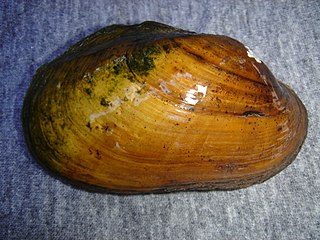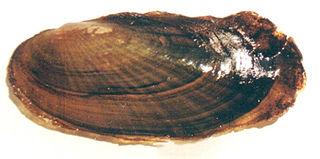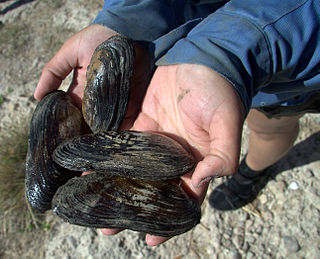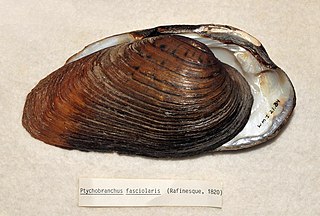The Sydenham River is a river in Chatham-Kent, Lambton County and Middlesex County in southwestern Ontario, Canada, flowing southwest from its source west of London, Ontario and emptying into Lake Saint Clair. The length of the river is 165 kilometres (103 mi) and it drains a watershed of approximately 2,700 square kilometres (1,000 sq mi). The river flows through the towns of Strathroy and Wallaceburg. It was named after Lord Sydenham, governor of Canada from 1839 to 1841.

Cyprogenia is a genus of freshwater mussels, aquatic bivalve mollusks in the family Unionidae.

The fanshell is a species of aquatic bivalve mollusk in the family Unionidae. This clam is native to the United States, where breeding populations remain in only three rivers. It is a federally listed endangered species of the United States.

The Tar River spiny mussel or Tar River spinymussel is a species of freshwater mussel in the family Unionidae, the river mussels. This species is endemic to North Carolina in the United States. This species is endemic to North Carolina in the United States. It is expected to become extinct without significant human intervention. Under the Endangered Species Act, this species is listed as endangered in the United States.
Lampsilis dolabraeformis is a species of freshwater mussel in the family Unionidae, the river mussels. It is known commonly as the Altamaha pocketbook. It is endemic to Georgia in the United States, where it is known only from the Altamaha River system.

Hamiota perovalis, the orangenacre mucket or orange-nacre mucket, is a species of freshwater mussel, an aquatic bivalve mollusk in the family Unionidae, the river mussels.

Lampsilis powellii is a rare species of freshwater mussel known by the common name Arkansas fatmucket. It is endemic to Arkansas in the United States, where it occurs in the Ouachita, Saline, and Caddo River systems. It is one of two mussels endemic to Arksansas, the other being speckled pocketbook. It is a federally listed threatened species of the United States.

Leptodea leptodon, the scaleshell mussel or scale shell, is a species of freshwater mussel in the family Unionidae, the river mussels. This aquatic bivalve mollusk has disappeared from much of its historical range. It is endemic to the United States, where it is now present in four or fewer states; it is only found with any regularity in Missouri. It is a federally listed endangered species of the United States.

Obovaria retusa is a rare species of freshwater mussel in the family Unionidae, the river mussels. Its common names include golf stick pearly mussel

Pleurobema oviforme, the Tennessee clubshell, is a species of freshwater mussel in the family Unionidae, the river mussels. It is native to the eastern United States, where it occurs in Alabama, Kentucky, North Carolina, Tennessee, and Virginia. It also previously occurred in Mississippi.

Popenaias popeii, common name the Texas hornshell, is a species of freshwater mussel, an aquatic bivalve mollusk in the family Unionidae, the river mussels.

Ptychobranchus fasciolaris is a species of freshwater mussel in the family Unionidae, the river mussels. Its common name is kidneyshell.

Ptychobranchus is a genus of freshwater mussels in the family Unionidae.
The triangular kidneyshell is a species of freshwater mussel, in the family Unionidae, the river mussels. It is endemic to Alabama in the United States, where it is known from several rivers and streams in the Mobile River Basin. It is a federally listed endangered species of the United States.
The southern kidneyshell is a species of freshwater mussel, an aquatic bivalve mollusk in the family Unionidae, the river mussels.

Ptychobranchus subtentum, also known as the fluted kidneyshell, is a species of freshwater mussel, an aquatic bivalve mollusk in the family Unionidae, the river mussels.

The glochidium is a microscopic larval stage of some freshwater mussels, aquatic bivalve mollusks in the families Unionidae and Margaritiferidae, the river mussels and European freshwater pearl mussels.
Obovaria arkansasensis, the Ouachita creekshell, is a species of freshwater mussel, an aquatic bivalve mollusc in the family Unionidae, the river mussels. It is endemic to certain rivers and streams in the Ouachita Mountains, Arkansas, and has a complex life history including its larvae being parasitic on a fish host.

Strophitus undulatus is a species of mussel in the Unionidae, the river mussels. It is native to eastern Canada and the eastern United States. Its common names include creeper, squawfoot, sloughfoot, and strange floater.

Microcondylaea compressa is a species of freshwater mussel in the family Unionidae, the river mussels.













